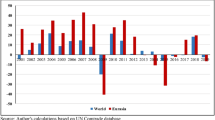Abstract
Fragmentation and Trade: US Inward Processing Trade in the EU. — Fragmentation, which refers to the splitting up of a previously integrated production process into separate components, is seen as one of the reasons for the increasing globalization of the world economy. This paper undertakes an empirical study of the extent of US inward processing trade (IPT) in the EU, which we use as a proxy for fragmentation in trade. We also provide empirical evidence on the determinants of the distribution of US IPT across manufacturing sectors in the twelve EU member states. Our results give support to the importance of comparative advantage for the sectoral distribution of US IPT. Also, we find that the labour costs and the level of US FDI stocks affect US IPT in EU peripheral countries, while they do not seem to have any impact on EU core countries.
Zusammenfassung
Die Aufspaltung von Produktionsprozessen und internationaler Handel: Die Lohnveredelung amerikanischer Unternehmen in der EU. — Die Fragmentation, die sich auf die Aufspaltung von bislang vertikal integrierten Produktionsprozessen bezieht, wird als einer der Gründe für die zunehmende Globalisierung der Weltwirtschaft gesehen. Dieser Artikel unternimmt es, empirisch den Umfang der Lohnveredelung amerikanischer Unternehmen in der EuropÄischen Union zu untersuchen, bei der amerikanische Unternehmen im Rahmen ihrer weltweiten Strategie zunÄchst Zwischenprodukte in die EU-LÄnder importieren, dort in Tochterfirmen weiter veredeln und dann wieder aus den EU-LÄndern exportieren. Aufgezeigt wird die empirische Evidenz von Determinanten, die die Verteilung der Lohnveredelung über die Industriesektoren in den zwölf EU-Mitgliedstaaten bestimmen. Die Ergebnisse bekrÄftigen die Bedeutung der komparativen Vorteile für die sektorale Verteilung der Lohnveredelung. Au\erdem zeigt sich, dass die Lohnkosten und der Bestand amerikanischer Direktinvestitionen die Lohnveredelung amerikanischer Unternehmen in den LÄndern am Rande der EU beeinflussen, wÄhrend sie für die KernlÄnder nicht von Bedeutung sind.
Similar content being viewed by others
References
Aristotelous, K., and S. Fountas (1996). An Empirical Analysis of Inward Foreign Direct Investment Flows in the EU with Emphasis on the Market Enlargement Hypothesis.Journal of Common Market Studies 34 (4): 571–583.
Arndt, S. W. (1997). Globalization and Trade: A Symposium.World Economy 20 (5): 695–707.
Balasubramanyam, V. N., and D. Greenaway (1992). Economic Integration and Foreign Direct Investment: Japanese Investment in the EC.Journal of Common Market Studies 30 (2): 175–193.
Baldone, S., A. Lasagni, and F. Sdogati (1997). Emerging Patterns of Trade Specialization EU-CEECs. In S. Baldone and F. Sdogati (eds.),EU-CEECs Integration: Policies and Markets at Work. Milan: Franco Angeli.
Ballance, R. H., H. Forstner, and T. Murray (1987). Consistency Tests of Alternative Measures of Comparative Advantage.Review of Economics and Statistics 69 (1): 157–161.
Baltagi, B. H. (1995).Econometric Analysis of Panel Data. Chichester: Wiley and Sons.
Barrell, R., and N. Pain (1996). An Econometric Analysis of U. S. Foreign Direct Investment.Review of Economics and Statistics 78 (2): 200–207.
— (1999). Trade Restraints and Japanese Direct Investment Flows.European Economic Review 43 (1): 29–45.
Deardorff, A. V. (1980). The General Validity of the Law of Comparative Advantage.Journal of Political Economy 88 (5): 941–957.
-(1998). Fragmentation in Simple Trade Models. Research Seminar in International Economics Working Paper 422. University of Michigan.
— (2000). Fragmentation across Cones. In S. Arndt and H. Kierzkowski (eds.),Fragmentation: New Production Patterns in the World Economy. Oxford: Oxford University Press, forthcoming.
Driffield, N., and M. Munday (2000). Competitive Advantage and the Determinants of Inward Investment in the UK. In R. Read and S. Thompson (eds.),New Horizons in International Trade & Industry. London: Macmillan, forthcoming.
Ennew, C., D. Greenaway, and G. Reed (1990). Further Evidence on Effective Tariffs and Tariff Protection in the UK.Oxford Bulletin of Economics and Statistics 52(1): 69–78.
Feenstra, R. (1998). Integration of Trade and Disintegration of Production in the Global Economy.Journal of Economic Perspectives 12 (4): 31–50.
Girma, S., D. Greenaway, and K. Wakelin (1999). Anti-dumping, Trade Barriers and Japanese Direct Investment in the UK. Centre for Research on Globalisation and Labour Markets Research Paper 99/4. University of Nottingham.
Görg, H., and F. Ruane (1999). US Investment in EU Member Countries: The Internal Market and Sectoral Specialization.Journal of Common Market Studies 37 (2): 333–348.
Greenaway, D. (1988). Effective Tariff Protection in the United Kingdom.Oxford Bulletin of Economics and Statistics 50 (3): 313–324.
Harris, R. G. (2000). A Communication-Based Model of Global Production Fragmentation. In S. Arndt and H. Kierzkowski (eds.),Fragmentation: New Production Patterns in the World Economy. Oxford: Oxford University Press, forthcoming.
Jones, R. W., and H. Kierzkowski (1990). The Role of Services in Production and International Trade: A Theoretical Framework. In R. W. Jones and A. O. Krueger (eds.),The Political Economy of International Trade. Oxford: Basil Blackwell.
— (2000). A Framework for Fragmentation. In S. Arndt and H. Kierzkowski (eds.),Fragmentation: New Production Patterns in the World Economy. Oxford: Oxford University Press, forthcoming.
Kierzkowski, H. (2000). Joining the Global Economy: Experience and Prospects of the Transition Economies. In S. Arndt and H. Kierzkowski (eds.),Fragmentation: New Production Patterns in the World Economy. Oxford: Oxford University Press, forthcoming.
Kokko, A. (1994). Technology, Market Characteristics, and Spillovers.Journal of Development Economics 43 (2): 279–293.
LundbÄck, E. J., and J. Torstensson (1998). Demand, Comparative Advantage and Economic Geography in International Trade: Evidence from the OECD.Weltwirtschaftliches Archiv 134 (2): 230–249.
Milner, C., and E. Pentecost (1996). Locational Advantage and US Foreign Direct Investment in UK Manufacturing.Applied Economics 28 (5): 605–615.
Neven, D. J. (1990). EEC Integration towards 1992: Some Distributional Aspects.Economic Policy (5): 13–62.
Quah, D. T. (1997). Increasingly Weightless Economies.Bank of England Quarterly Bulletin 37 (1): 49–56.
Ruane, F., and H. Görg (2000). Globalisation and Fragmentation: Evidence for the Electronics Industry in Ireland. In S. Arndt and H. Kierzkowski (eds.),Fragmentation: New Production Patterns in the World Economy. Oxford: Oxford University Press, forthcoming.
Venables, A. J. (1999). Fragmentation and Multinational Production.European Economic Review 43 (4/6): 935–945.
Zhang, K. H., and J. R. Markusen (1999). Vertical Multinationals and Host-Country Characteristics.Journal of Development Economics 59 (2): 233–252.




